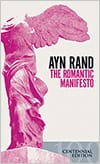Hi, Guest!

A concept is a mental integration of two or more units which are isolated by a process of abstraction and united by a specific definition. By organizing his perceptual material into concepts, and his concepts into wider and still wider concepts, man is able to grasp and retain, to identify and integrate an unlimited amount of knowledge, a knowledge extending beyond the immediate concretes of any given, immediate moment.
In any given moment, concepts enable man to hold in the focus of his conscious awareness much more than his purely perceptual capacity would permit. The range of man’s perceptual awareness — the number of percepts he can deal with at any one time — is limited. He may be able to visualize four or five units — as, for instance, five trees. He cannot visualize a hundred trees or a distance of ten light-years. It is only his conceptual faculty that makes it possible for him to deal with knowledge of that kind.
Man retains his concepts by means of language. With the exception of proper names, every word we use is a concept that stands for an unlimited number of concretes of a certain kind. A concept is like a mathematical series of specifically defined units, going off in both directions, open at both ends and including all units of that particular kind. For instance, the concept “man” includes all men who live at present, who have ever lived or will ever live — a number of men so great that one would not be able to perceive them all visually, let alone to study them or discover anything about them.
Concepts and, therefore, language are primarily a tool of cognition — not of communication, as is usually assumed. Communication is merely the consequence, not the cause nor the primary purpose of concept-formation — a crucial consequence, of invaluable importance to men, but still only a consequence. Cognition precedes communication; the necessary precondition of communication is that one have something to communicate . . . .
The primary purpose of concepts and of language is to provide man with a system of cognitive classification and organization, which enables him to acquire knowledge on an unlimited scale; this means: to keep order in man’s mind and enable him to think.